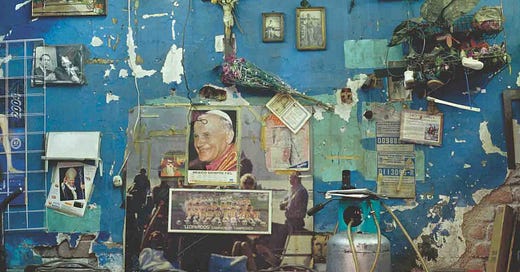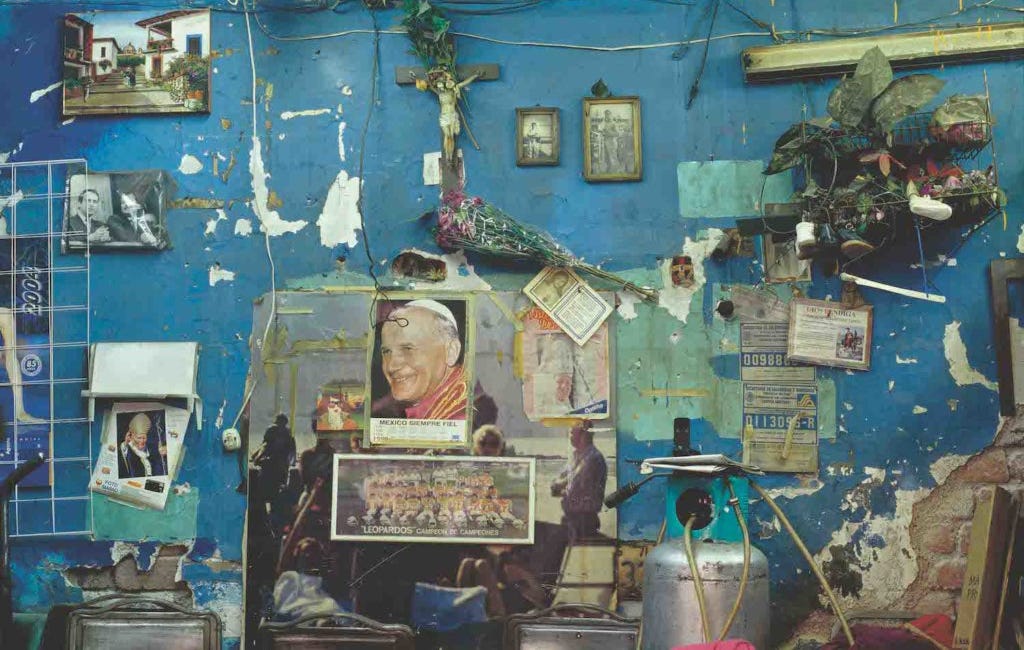Favorite Longreads of 2024
Five beautiful pieces from Mexico City, Moscow, Kashgar, Ukraine and London
Photo: Gala Narezo, from “Locales,” Stranger’s Guide: Mexico City
While new year beckons, we wanted to send one last Longread, looking back at some of our favorite essays we sent you this year. The five pieces below feel especially resonant as we move into 2025. They feature authors from Moscow, Mexico City, Tehran, Xinjiang and Ukraine offering meditations on identity, courage and the power of stories to keep communities together.
The last 12 months saw elections in more than 60 countries around the world, with billions of people voting–in many cases voting out incumbents. Surveying 31 countries, Pew reports most adults to be “dissatisfied with the way democracy is working.” Authoritarianism is on the rise, but so too have been mass movements demanding democratic reforms. Some of those movements have even been successful.
At Stranger’s Guide, we tend to be wary of grand predictions. By focusing on stories from authors around the world about the ways broad global themes play out in the intimacy of daily life, we offer the kind of context and nuance that’s too often lacking in media coverage.
And we believe that in the coming year, this approach will matter more and more.
That’s why we’re excited about our new chapter. (Read our announcement here.) Through multiple weekly emails, you’ll see original work from authors around the world, through short vignettes, longreads and photography, as well as more print guides. And in January we’ll be launching several new features we’re tremendously excited to show you.
As we usher in a new year, please know how grateful we are to you for being part of this globally curious community. We’re leaning in and we hope you will too.
Happy 2025 to you and yours.
Please note this newsletter may cut off in your email. You can also read it in full on our site.
Dangerous Crossings
Abduweli Ayup explains why he risked prison to keep the Uyghur culture alive, produced in partnership with Coda Story as part of our Complicating Colonialism volume
I knew Ramadan would start on June 28 because someone in the cell before us had carved a calendar into the wall with their fingernail. Late at night, after the task of watching over the other prisoners was assigned, someone else in our cell was selected to scratch off the old day. Everyone would bicker among themselves for the chance to erase another day of their sentence, but since I believed that I would be in there for life, the calendar didn’t interest me much. I’d often forget to mark it when it was my turn.
Ukraine: This is Who We Are
Haska Kerosina Shyyan's meditation on Ukraine's tragedies and triumphs, joys and pains
The fact that you are holding this book in your hands, and even feel curiosity toward reading it, probably means you are interested in this massive land, situated somewhere between Europe and Russia. You probably still see it as terra incognita, and as part of mysterious Slavic space, with its intriguing and slightly wild soul.
The language of brotherhood
Salar Abdoh's essay on friendship and blindness in the British Empire, produced in partnership with Coda Story as part of our Complicating Colonialism volume
All my life I’ve known versions of blindness. It began at a very young age when, from certain angles I would see two of everything – two homes, two cars, two of the same boy in kindergarten who wanted to fight me and did, two mothers, two of the Turkish dayah whom I always considered my real mother.
Blindness can be seeing too much of things, just as much as seeing too little.
Under God
Dmitry Bykov on the one corner of Moscow that remains sacred
There are places in Moscow that are directly under God’s protection, places for the sake of which Moscow is still tolerated. Even though it probably shouldn’t be. Today’s Moscow is disgusting. But it has a few strange places that nothing will ever happen to. There are points of absolute evil, like the Kremlin, and there are expanses of pure poetry where you can sense the presence of the irrational and mysterious. One such is Lenin Hills, which I call that not out of love for Lenin but out of loyalty to my childhood, even though the original name, Sparrow Hills, is back.
The Big Little Things
Elena Poniatowska on gentrification in Mexico City's Roma neighborhood and the importance of community stories
We do not choose our birth, our parents, our country or when we will die, but we do choose, or can choose, what we will hang on the wall. Whether the choice be spontaneous or despairing: to hang or be hung, the affirmation of a person on the earth, the proof of our love, our legacy, our destiny, our place on this planet, our reason for living. The big little things in our lives are the symbols of our identity and the space we inhabit: the picture on the shrine that deepens the mystery of a love life, the amulet, the pressed violet, the love letter, the lucky deck of cards, the first communion medal, the wedding ring or any one of those magic objects that when lost makes us go insane.









